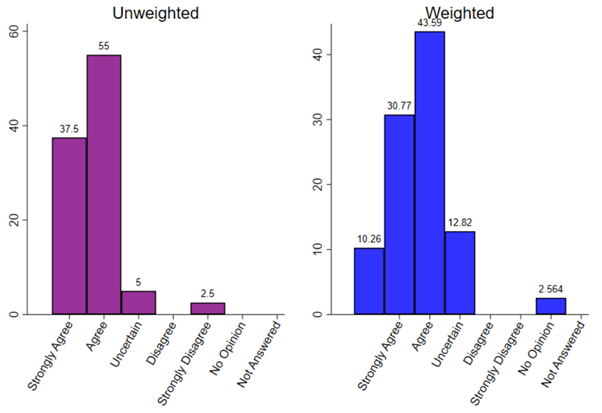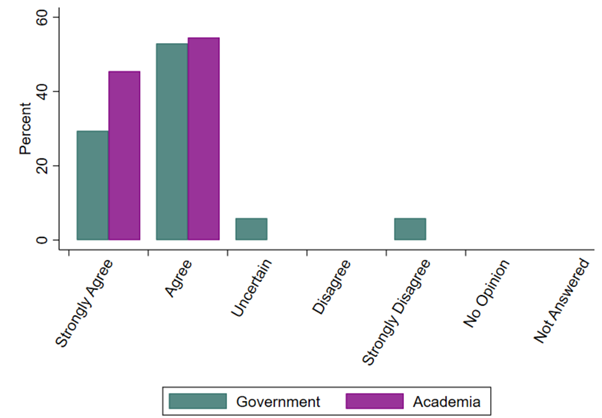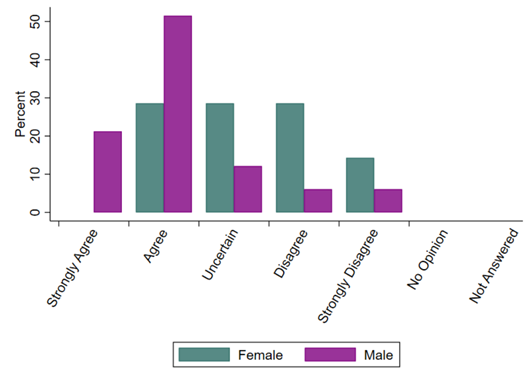Academic and government NZAE members divided on greed inflation
Reporting back on NZAE Member Survey #5
In the fifth NZAE Member Survey we ask questions related to EQC premiums, corporate profits and minimum wages.
Survey details
The survey was circulated amongst NZAE members on Monday, March 13 and was open until Friday, March 17. During this time, 42 respondents answered the survey. On average, 83 percent of respondents are male, and 44 percent hold a PhD. Most respondents work in academia or in the government (66%). Most people are in the 41-50 age group (26%).1
Weighting
The survey also elicits the confidence in the answer to each of the three questions. This information can be used to weight the responses. Below, we will present the unweighted (raw) and weighted survey responses.2
EQC Premia
EQC premiums vary with value at risk, but not with underlying risk, creating both an implicit transfer from those living in safer places to those living in riskier places, and an incentive to live in riskier places. EQC risk-adjusting premiums would encourage development in safer places, increasing resilience against climate and other shocks.
We find that the majority of respondents strongly agrees (38%) or agrees (55%) with this statement. Only 2.5% strongly disagree with 5% uncertain. Interestingly, males more often answer “strongly agree” compared to females3. Respondents in academia are much more likely to strongly agree compared to the government sector.4
Greed Inflation
In question 2, we ask about market failure:
High nominal corporate profits are a consequence of high inflation rather than a cause of high inflation.
Here, we find that most respondents answer “agree” (49%) or “strongly agree” (18%). Only 17% disagree or strongly disagree with this statement. Males are much more likely to strongly agree or agree compared to females, who are much more likely to disagree or strongly disagree.5 Similarly, respondents working in academia are much more likely to strongly agree or agree compared to respondents working in government (who strongly disagree, disagree, or are uncertain).6 Hence, we find the strongest disagreement in our surveys yet between academics and government economists.
Minimum Wage Policy
The final question is related to the 2023 minimum wage change and has three parts:
A. The 2023 minimum wage increase is likely to have little effect on overall current employment.
B. The 2023 minimum wage increase is likely to have potentially negative effects on employment of riskier workers.
C. The 2023 minimum wage increase is likely to have more risk of harm to employment in any coming recession.
For part A of the question, most people agree or strongly agree (76%). We find substantial differences between government and academic respondents. While government respondents almost entirely agree or strongly agree, academics are more likely to agree or to disagree revealing much higher within heterogeneity.7
For part B, again the majority agrees or strongly agrees (61%). We find general agreement between academics and government economists.8
Finally, part C shows the largest heterogeneity: 50% agree or strongly agree but 30% disagree. While academics mainly agree or strongly agree, government respondents tend to disagree or strongly disagree.9
Without an optimal weighting approach, we weight the survey responses as follows. We first compute the mean confidence for each question. Then, for each respondent, we compute the absolute distance from the confidence mean weighted by the confidence standard deviation. If the response is above (below) the midpoint (i.e. disagree and strongly disagree) and the confidence is above mean confidence, we add (subtract) the weighting factor. If the response is above (below) the midpoint (i.e. disagree and strongly disagree) and the confidence is below mean confidence, we subtract (add) the weighting factor. We also use a multiple this weighting factor by 0.49 to smooth the weighting.



















On question 2, in Stats NZ I see no sign that nominal corporate profits are particularly high, even though inflation is high. Therefore I disagreed with that answer, quite independently of any of my opinions about the causes of inflation.
Since I'm female, and I work in government, do the gender and employment differences here imply something about men's and academia's (lack of) tendency to fact-check? :)